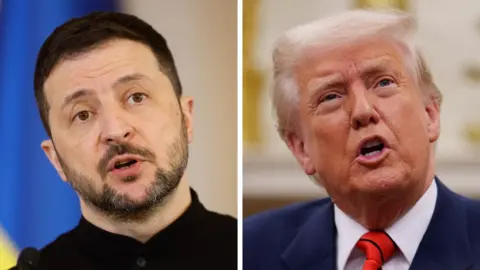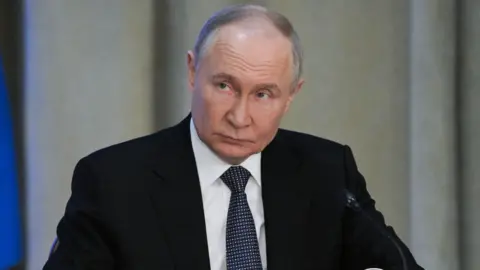Trump suggests US could run Ukraine's power plants
 Getty Images
Getty ImagesUS President Donald Trump has held what he described as a "very good" hour-long phone call with his Ukrainian counterpart Volodymyr Zelensky, a day after speaking to Russia's President Vladimir Putin.
Zelensky said afterwards that he believed that "lasting peace can be achieved this year" under Trump's leadership.
Possible US ownership of Ukraine's nuclear power plants was also discussed, the White House said, though this has been ruled out by Zelensky.
The tone of the call seems to be in contrast to Zelensky's visit to the White House last month, in which the two leaders - along with US Vice-President JD Vance - were involved in a tense exchange.
Wednesday marked the first time the two men have spoken since that Oval Office meeting - although since then, their teams have met in Saudi Arabia and negotiated a proposed 30-day ceasefire.
While it is backed by Ukraine and the US, Putin rejected the proposal for a widespread pause in the conflict during his phone call with the US president on Tuesday.
In his conversation with Trump, Zelensky said he was open to a partial ceasefire involving a halt on strikes on energy infrastructure, rail and port facilities that could be established quickly - but the Ukrainian president warned his country would retaliate if Moscow violated the terms of the ceasefire.
"I understand that until we agree [with Russia], until there is a corresponding document on even a partial ceasefire, I think that everything will fly," he said, referring to drones and missiles.
While both Zelensky and Putin have said they would agree to halt attacks on energy infrastructure, both have since accused each other of continued attacks.
Writing on his Truth social platform, Trump said the call was aimed at aligning Ukraine and Russia "in terms of their requests and needs", adding that ceasefire efforts were on track.
Later, in a more detailed statement, US Secretary of State Marco Rubio said Trump had agreed to help Ukraine source additional air defence systems, particularly in Europe.
The two leaders "agreed to share information closely between their defence staffs as the battlefield situation evolved", he said.
Rubio's statement also said Trump and Zelensky had discussed "Ukraine's electrical supply and nuclear power plants" with Trump saying the US "could be very helpful in running those plants with its electricity and utility expertise".
"American ownership of those plants would be the best protection for that infrastructure and support for Ukrainian energy infrastructure," Rubio's statement added.
But when asked about the suggestion at a news conference in Norway on Thursday, Zelensky said: "All nuclear power plants belong to the people of Ukraine. These are state-owned nuclear power plants."
Zelensky said that he and Trump had discussed the nuclear power plant at Zaporizhzhia, located in Russian-held territory, but that he had told the US president: "If it does not belong to Ukraine, it will not work for anybody."
He added that he "definitely did not discuss" a change of ownership, but had told Trump he was "open to discuss" the US taking the Zaporizhzhia plant from Russia to invest in and modernise.
The latest developments will come as a relief for Zelensky, who described his conversation with Trump as "positive", "frank" and "very substantive" during an online briefing to journalists on Wednesday.
Zelensky also said he believed Putin would not agree to a full ceasefire while Ukrainian troops remained in Russia's western Kursk region, on which Kyiv launched a surprise attack last August.
Trump, meanwhile, said: "Much of the discussion was based on the call made yesterday with President Putin in order to align both Russia and Ukraine in terms of their requests and needs."
Teams from Ukraine and the US are expected to meet in Saudi Arabia in the coming days.
 EPA
EPAIn the White House last month, Trump told Zelensky he was not thankful enough for US military and political support, and that he was "gambling with World War Three".
The US temporarily then suspended military aid and intelligence sharing with Ukraine, but diplomats were able to improve relations and on 11 March the two sides agreed on a ceasefire.
During his call with Trump on Tuesday, Putin agreed to halt Russian attacks on Ukraine's energy infrastructure.
But he said a full ceasefire would only work if Ukraine's supporters stopped giving military assistance - a condition Kyiv's European allies have previously rejected.
Hours later both Ukraine and Russia launched attacks, with Kyiv saying hospitals had been targeted.
Officials in the southern Russian region of Krasnodar said that a Ukrainian drone attack sparked a small fire at an oil depot.
Despite the strikes, Kyiv and Moscow carried out an exchange of prisoners on Wednesday. Each side released 175 POWs.
Zelensky described the swap as "one of the largest", adding that Russia included an extra 22 "severely wounded" soldiers.